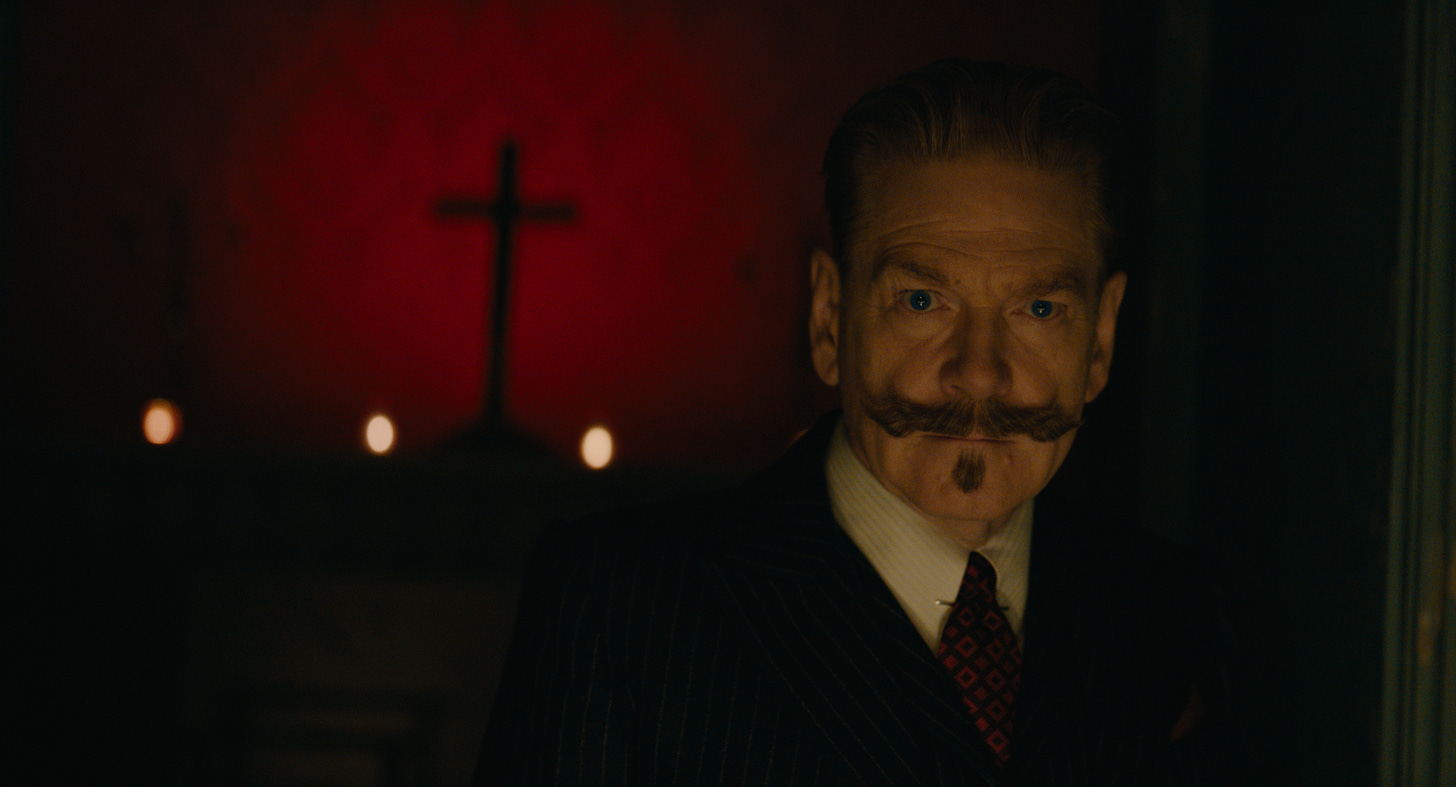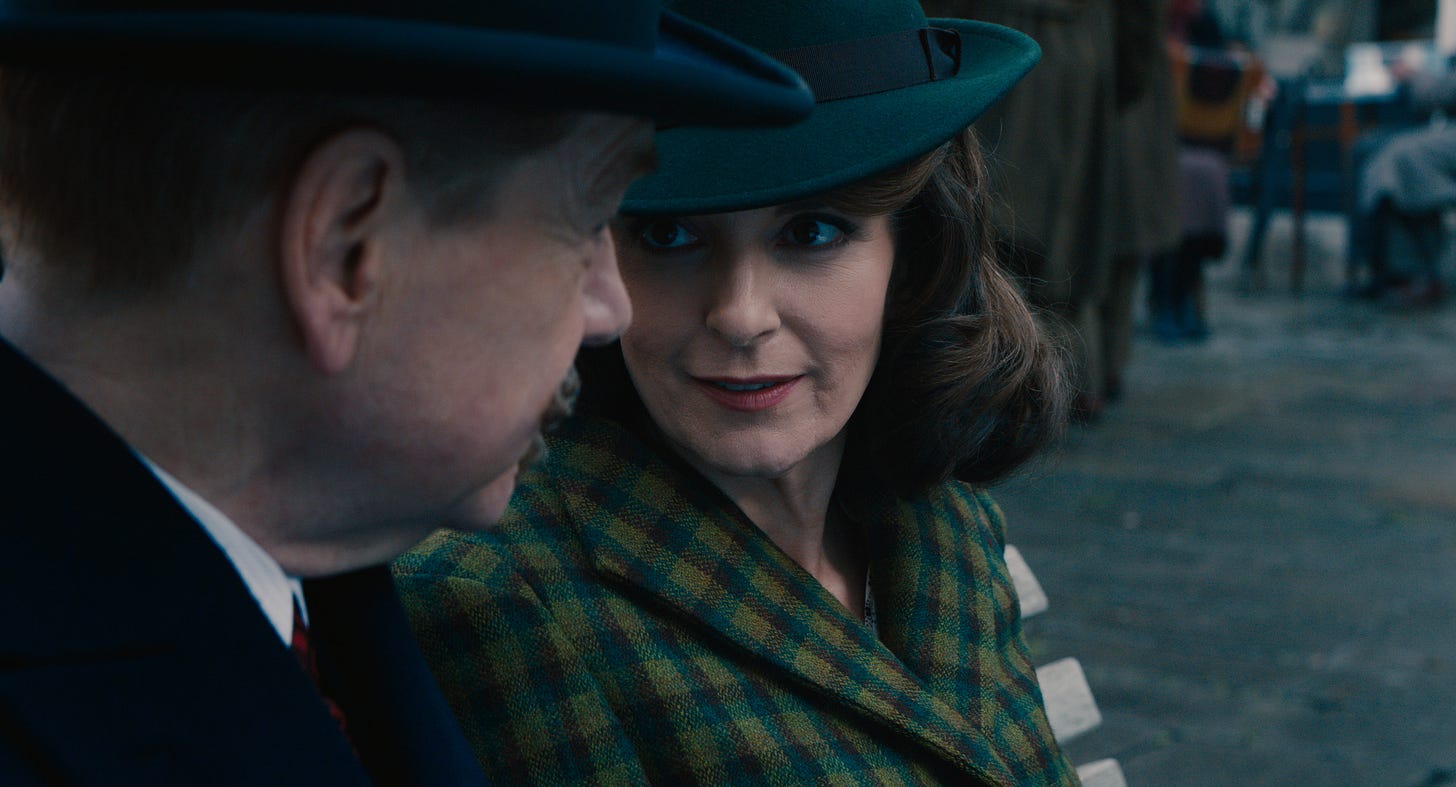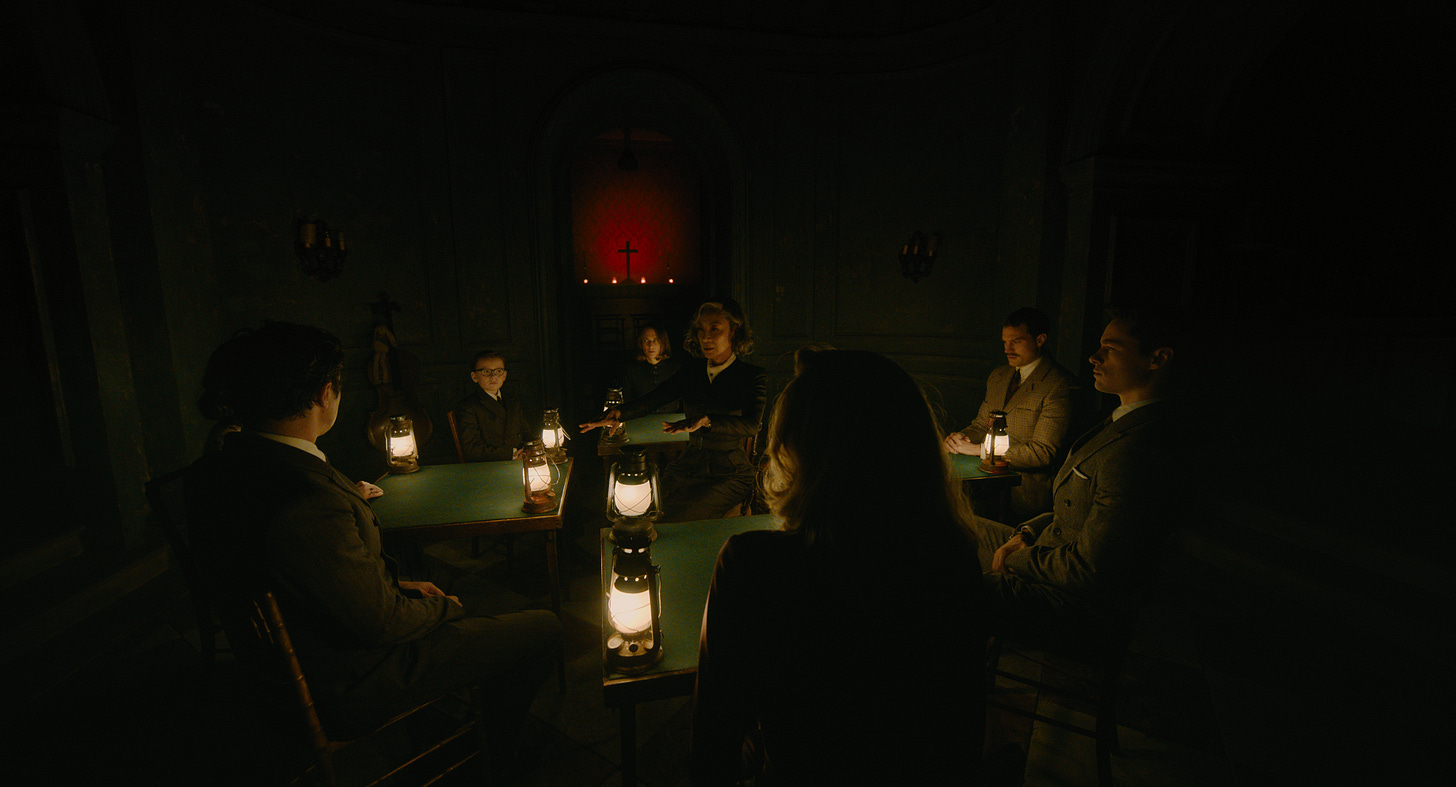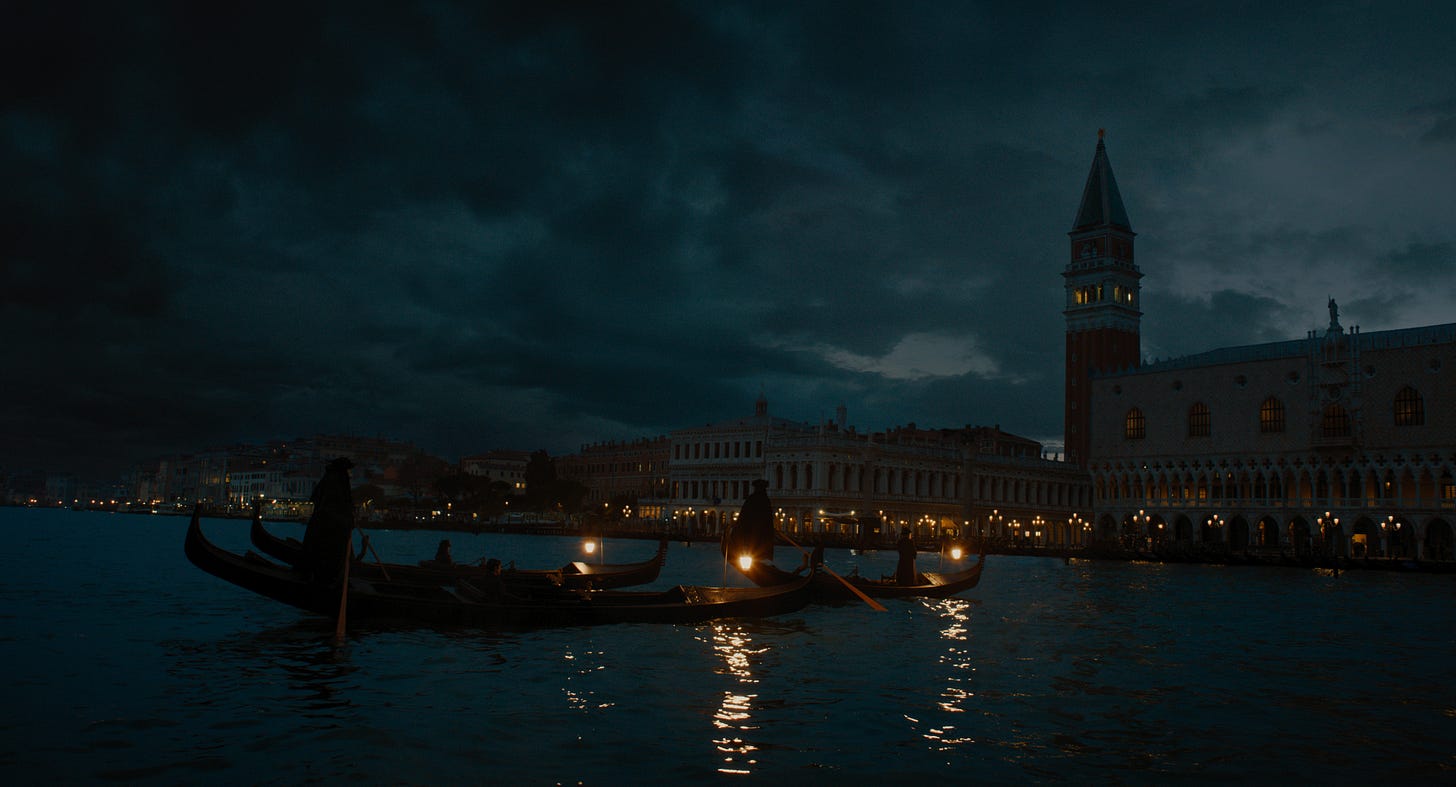Spiritual Renewal in A Haunting in Venice
Kenneth Branagh's third Poirot mystery film brings with it some of the best Christian themes of 2023.
“I would welcome, with open arms, any honest sign of [a] ghost. For if there is a ghost, there is a soul. If there is a soul, there is a God who made it. And if we have God, then we have everything. Meaning, order, justice.”
Long time readers of my site will know that I love finding Christian themes in films, and by far my favorite thematically Christian film of 2023 was A Haunting in Venice. The film is the third of Kenneth Branagh’s mystery films based on Agatha Christie’s novels and her character, detective Hercule Poirot. While I enjoyed 2017’s Murder on the Orient Express, and to a lesser extent 2022’s Death on the Nile, A Haunting in Venice is by far my favorite of the series, with some of the year’s best cinematography, Branagh’s signature quirky Poirot performance, an eery atmospheric musical score, and of course, a thematic richness that elevates the experience beyond a “simple” mystery.
At its core, the film is a tale of spiritual revival, begging its characters (and viewers) to consider something bigger than themselves and to live out his or her purpose in this life. As Poirot confronts the alleged ghosts at the center of the mystery, he also comes to terms with the ghosts of his past, finding a renewed faith and sense of purpose along the way.
No God, No Ghosts
We open the film on a surprisingly resigned Poirot. He has retired to Venice, refusing to help anyone or to engage in any more detective work. It quickly becomes clear that he has lost all sense of hope and meaning, his faith in God and humanity completely gone.
The story kicks into gear when mystery writer Ariadne Oliver meets with him, hoping to coerce him into attending a séance with her to expose a medium’s tricks. But despite her pleas, Poirot continually refuses.
ARIADNE OLIVER
It’s true. Hercule Poirot really has gone silent. Walled himself up into retirement. Cakes for cases.
POIROT
I am much satisfied.
ARIADNE OLIVER
No. This is happiness not satisfaction. A writer knows the difference.While brief, I love the distinction here between happiness and satisfaction. While the things of this world may provide temporary happiness, the Bible tells us time and time again that we’ll ultimately have an emptiness and dissatisfaction without God. “For I will satisfy the weary soul,” says Jeremiah 31:25, and Christ teaches in the Beatitudes “Blessed are those who hunger and thirst for righteousness, for they shall be satisfied (Matthew 5:6).”
Poirot may have fooled himself into finding happiness in his reclusive dwelling and tiny cakes, but it’s apparent to Ariadne and to the audience that he’s lonely and unfulfilled, no matter his claims otherwise.
While he does finally relent and agree to accompany Ariadne to the séance, Poirot refuses to engage with the potential for the supernatural, a skeptic every step of the way. Ariadne implores him, “For once in your life, admit that you are up against something bigger than you.”
“I have lost my faith” Poirot responds honestly. “I have seen too much of the world. Countless crimes. Two wars. The bitter evil of indifference. And I conclude, no, no god, no ghosts.”
It’s a fair reason for skepticism. The world is a cruel place, and Poirot has seen that first hand as both a soldier and a detective, uncovering countless displays of humanity’s wickedness. I’ve written about Job in more depth before, but Poirot’s doubts about God mirror Job’s own. Just compare the film with these passages from Job, first with Poirot speaking on God’s silence:
When I was a boy I prayed all night for God to do something. To prove he was real. Send an angel, a ghost -- anything. Push over this glass of water, knock it down. He did not. He could not do the simplest thing. Because there is no god. No ghosts. Nothing.
And now with Job speaking on the same (Job 19.7, 30.20, 30.26, 31.35):
Though I pray to be rescued from this torment, no whisper of justice answers me. I beg God for help, but there is no answer; and when I stand up, he simply stares. When I beg for relief and light, all I receive are disaster and darkness. Why doesn't God All-Powerful listen and answer?
The Look Like a Believer
I won’t be summarizing the entire plot of the film, but after a guest at the séance is murdered, Poirot is all but forced to solve the case, interviewing the other guests, investigating the scene of the crime, and ultimately unraveling the scheme behind the entire event.
Throughout the course of the night, he learns he was poisoned and in a somewhat hallucinatory state. And yet, there are some things he still can’t explain. Who has been calling to him throughout the night? Did a spirit manifest in the house to expose and avenge their death? Were these phenomena all due to his foggy mind, or did he really experience the supernatural?
Ariadne confronts Poirot at the end of the film, noticing his rattled state from some of the night’s unexplainable events.
ARIADNE OLIVER
You’ve got the look like a believer. You saw something. You know.
POIROT
I know only we cannot hide from our ghosts. Whether they are real or not. We must make our peace with them. And live life somehow.
ARIADNE OLIVER
And how will you live your life?I’ve already made biblical comparisons to Job, but Poirot's abandonment and eventual return to detective work also makes him a character akin to Jonah, running from the Lord’s commands only to ultimately obey Him after a series of fantastical experiences. For that matter, the shot of Poirot’s gondola entering the mouth of a dark building could very well be seen as him entering the belly of the whale, a time of testing, but ultimately of renewal.
Of course, Poirot’s story ends on a much more uplifting note than that of Jonah. While the book of Jonah ends with him still questioning God’s plans, Poirot appears to be a new man. The film cuts from Ariadne’s question (“how will you live your life?”) to Poirot now excitedly engaging with and solving cases he had previously ignored. The script describes his newfound demeanor as evidence of his spiritual rebirth, his “eyes alert despite the sleepless night, ignoring the city view to scan through documents and make his notes.”
No matter how he tried to turn away from his calling, Poirot was meant to help others through his detective work, and realizing that brings him peace and rejuvenation. And this film calls Christian viewers to do the same: embrace our God-given gifts and use them to help others and glorify Him.
So if you’ve got the look like a believer…how will you live your life?





